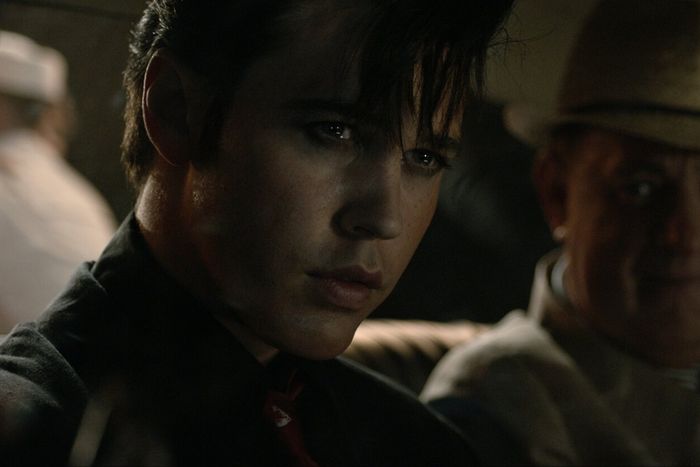
Like someone who’s been told not to look directly at the sun during an eclipse, Elvis filters the story of its legendary subject through the diffusive lens of manager and Svengali Colonel Tom Parker, a carny turned music promoter who met Presley when the singer was 20 and who accompanied him on his rise to fame (taking a hefty cut in the process). And like someone who can’t help but turn their gaze upward anyway, even if it sears their retinas to crisps, Elvis forgets about its own framing for long stretches to just revel in slack-jawed awe at its version of the King. Who was director Baz Luhrmann kidding, pretending he wanted to ground his film in a character who, played by Tom Hanks in puddles of prosthetic jowls, squats toadlike on the wings? There is no subject better suited to Luhrmann’s opulent, excessive stylings than Elvis Presley, which is as much a threat as a reassurance. Elvis is bloated, hectic, ridiculous, and utterly shameless in all it glosses over to present its thesis on Presley as a talent too beautiful for this earth — the Christ of show business, sacrificed to our rapacious desires and the cruelties of capitalism at the age of 42. And you know what? I liked it, though my corneas did feel a little crunchy afterward.
There is one obvious reason for Luhrmann, who wrote the script with Sam Bromell and Craig Pearce, to begrudgingly have the Colonel narrate Elvis, which is that the device frees the film up from having to treat Elvis himself as flesh and blood. Instead, he’s more like a divine being who miraculously ended up among us mortals, which may be the Colonel’s perspective and seems to be Luhrmann’s as well. One of our first glimpses of the young performer, played by Austin Butler, is from behind, draped against some flotsam at a carnival like a country-boy odalisque, his beauty evident even from the partial view. The shot is electric with a secondhand lasciviousness — not lust so much as an appreciation of the lust that the screaming fans will soon exude. He’s that rare thing, the star that no one else sees as a star yet. Butler, that Anaheim-born former teen star, is improbably, absurdly great at playing someone who’s more image than man. He relaxes under the heat of the stage lights and the camera’s surveillance, leveling his heavy gaze and syrupy drawl at the crowds who gather to see him perform and at the audience, one level removed, sitting in the theater.
Elvis is an exercise in consensual objectification — or maybe that’s just what idolization is. The first time we see Elvis perform, it’s in Shreveport for the radio show “Louisiana Hayride,” and the film cuts frenetically from his jittering hips to the expressions of some of the women in the audience, ecstatic, terrified, letting out the screams bubbling up inside them as though they were feeling the spirit. They’re the faces of people who, as the Colonel puts it, were having feelings they weren’t sure they should be enjoying, and that look pops up again and again throughout the movie, not only with women, as though Elvis’s career were one long saga of sexual awakenings. Luhrmann, who once had Nicole Kidman die of some delicately coughed up blood, is not afraid of clichés, and Elvis indulges in plenty, from the Colonel narrating from his hospital deathbed to the moment right out of Walk Hard when a bandmate holds out a pill he promises will “put the pep back in your step.” But the movie can’t be confined to formula and keeps spilling out beyond its borders to end up as something weirder. Inconvenient sections of its subject’s life, like his romancing the teenage Priscilla Beaulieu, are skimmed over, but then so are any parts that Luhrmann just doesn’t seem interested in.
That stint in Hollywood and Presley’s following career stagnation? Consigned to a montage, while his ’68 comeback special takes up considerable screen time. Accusations of appropriation? Elvis is portrayed as the always-welcome friend and ally of the Black communities he lifts ideas from. We hear, at a certain point, that Elvis is fretting about his waistline, but while Elvis changes the singer’s style and hair choices with the times, it opts out of changing his body or face until the very end, as though it can’t bear it. The Colonel, who Hanks plays with a zestful, geography-defying accent that’s downright Leto-like, ages, growing gray and liver-spotted, as though he and his client were in some kind of Dorian Gray arrangement. The Colonel insists, on those occasions when the film thinks to return to him, that Elvis’s death wasn’t his fault but the fault of the audience who couldn’t get enough of him. It’s not a very convincing claim, but it feels key to the melancholy running through the film, and that certainty in stardom as its own singular, magical resource. The Colonel may not ever have access to it himself, but he recognizes it when he sees it and knows enough to mine it for all that it’s worth when he’s given the opportunity. Elvis meanders and mesmerizes not because it’s a great film about Presley but because it’s a fascinating one about the feeling of being at the side of greatness, trying to desperately harness yourself to it in some way with the understanding that you could at any time be left behind.





